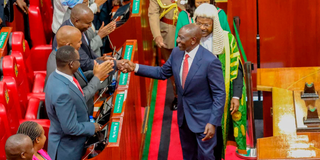Premium
Lobby calls on Parliament to reject Bill that will allow Ruto to poach opposition MPs

President William Ruto greets Members of Parliament after he delivered his State of the Nation Address at Parliament Buildings in Nairobi on November 21, 2024.
What you need to know:
- The Bill is co-sponsored by President William Ruto’s Kenya Kwanza coalition and Mr Odinga’s Azimio coalition.
- Mr Odinga’s Azimio also proposed to have specific timelines for expelling MPs accused of “political prostitution.”
A section of the civil society wants Parliament to shoot down a Bill that seeks to allow the president to poach members of opposition parties, including elected leaders, at will without attendant sanctions.
The Coalition Political Parties for Justice (CPJ) in Kenya notes that the Political Parties (Amendment) Bill 2024, currently before the Senate, will kill the spirit of multiparty democracy if passed in its current form.
“We in CPJ strongly oppose this Bill as it will allow party members including elected leaders including the president to among others, promote the ideologies and interests of rival parties,” says CPJ Executive Director Mr Amos Nyasani.
Clause 6 of the Bill proposes to amend the Political Parties Act by repealing section 14A that explains when a member is deemed to have resigned from a political party.
“A person who, while being a member of a political party, shall be deemed to have resigned from that party if that person forms another political party, joins in the formation of another political party or joins another political party,” the law targeted for repeal, reads.
The law goes on to state that one is deemed to have resigned from a political party if in any way or manner, publicly advocates for the formation of another political party or promotes the ideology, interests or policies of another political party.
“This Bill aspires to reduce the political parties to vehicles of convenience where members will use them for expediency and abandon them when their interests come calling, effectively diluting the concept of party discipline, the cornerstone of the country’s multiparty democracy,” Mr Nyasani says.
The Bill is co-sponsored by President William Ruto’s Kenya Kwanza coalition and Mr Odinga’s Azimio coalition through the leader of majority in Senate Aaron Cheruiyot (Kericho, Kenya Kwanza) and his minority colleague Stewarts Madzayo (Kilifi, Azimio).
Although the Bill is a product of the National Dialogue Committee (Nadco) report that was adopted by Parliament in February 2024, it goes against the recommendations of the report that advocates for party discipline in the nurturing and promotion of political parties in the country.
Its enactment will for instance, allow the leader of majority in the National Assembly Kimani Ichung’wah (Kikuyu, UDA), the free will to support and propagate the interests and ideologies of rival parties like DP or Wiper.
The Bill also goes against the views of Azimio, led by ODM, law scholar Prof Githu Muigai, former Attorney-General Amos Wako, the immediate former Busia Senator and the Office of Registrar of Political Parties (ORPP) presented to Nadco.
Nadco, co-chaired by Wiper leader Kalonzo Musyoka and Mr Ichung’wah, was established to reform the country’s electoral sector following deadly protests that followed the outcome of the 2022 general election.
“The move by a section of elected or nominated leaders to disobey party rules by purporting to unilaterally collaborate with competing political parties had adversely affected party discipline and national character of political parties,” ODM made its case to the Nadco team.
“Though it was a constitutional right of any person to join any party, such a person must not be allowed to benefit from a sponsoring party while promoting interests of a competing party,” ODM noted.
The Azimio coalition proposed to the Nadco team the introduction of express provisions in relevant statutes that compelled elected or nominated members who crossed over to another party to seek fresh mandate from the people by amending Article 130 of the constitution and Section 14 of Political Parties Act.
Mr Odinga’s Azimio also proposed to have specific timelines for expelling MPs accused of “political prostitution.”
This included limiting court processes to 60 days and amending the constitution to compel Speakers of Parliament and County Assemblies to implement the decision of a political party expelling elected members “without leeway within 14 days from the date of receipt of the request by the party.”
This is however, if the decision was successfully challenged by an aggrieved member in the appropriate judicial process.
The Nadco team in its report, recommended that the constitution be amended “to promote multipartyism and fidelity to Political Parties by entrenching procedures for resignation and deregistration of members of political parties in seeking to ensure party discipline.”
The Nadco report also pushed for a constitutional amendment to provide that a Political Party may enter into a pre or post coalition agreement with another political party or political parties.
Part of the formation of Nadco, was the push by Azimio coalition led by ODM leader Raila Odinga, for clarity on the punitive measures that included excommunication from sponsoring parties of elected leaders advocating for the interests of rival or other parties.
In so doing, Azimio wanted the deeming principle in the Political Party Act strengthened to eradicate what Mr Odinga called “political party prostitution."
Prof Muigai, the Attorney-General emeritus, had told the Nadco team that an MP was obligated to remain loyal to the party that sponsored him or her for the full term of the House.
“If one disassociated from the party, then he or she would be required to seek a fresh mandate from the people,” Prof Githu had told the Nadco team.
Mr Wako, in his submission to Nadco, observed that multiparty democracy in Kenya should be promoted.
“In this regard, if an elected representative advances the interests of another party, he or she shall be deemed to have resigned from the party that sponsored him or her and should therefore seek a fresh mandate from the electorate,” said Mr Wako.





